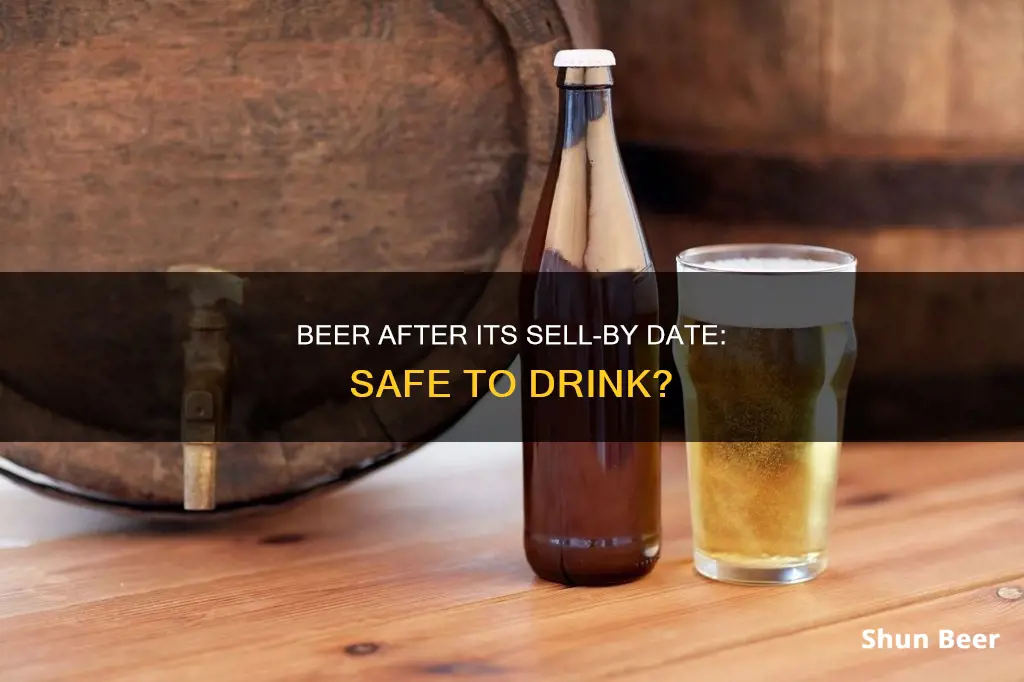
Beer typically has a 'best before' date rather than a 'use by' date, meaning it is safe to drink past the date on the container. The taste of the beer will deteriorate over time, but it won't be dangerous to drink. The amount of time beer lasts for depends on the type of beer and how it is stored. A standard lager will normally last around 6 months to 2 years after the best before date if kept in the fridge, and 6-9 months if kept in the cupboard. Beers with higher alcohol content, such as imperial stouts and porters, can last 5-10 years or more. Beer is sensitive to light and temperature changes, so it should be stored in a cool, dark place.
| Characteristics | Values |
|---|---|
| Safety | Beer is generally safe to drink past its sell-by date. |
| Taste | The taste of the beer will deteriorate over time. |
| Storage | Beer should be stored in a cool, dark place to avoid it "skunking". |
| Type | The type of beer will affect how long it lasts past its sell-by date. |
What You'll Learn

Beer won't be harmful past its sell-by date, but the taste will deteriorate over time
Beer typically has a 'best before' date rather than a 'use by' date. This means that it is safe to drink past the date on the container, but the taste will gradually change over time. While it won't be harmful, the flavour of the beer will deteriorate and it may develop an off or skunked flavour.
The amount of time beer lasts past its best-before date depends on the type of beer and how it is stored. Normal beers such as lagers, IPAs, and pale ales will normally last around 6 months to 2 years after the best-before date if kept in the fridge, and 6–9 months if kept in the cupboard. However, some beers are created with ageing in mind and can taste better over time. These tend to be high-alcohol beers such as imperial stouts and porters, which can last 5–10 years or more, depending on the beer.
To keep beer tasting as good as possible for as long as possible, it should be stored in a cool, dark place, ideally in the fridge at a temperature of 2–7° Celsius. Beer is very sensitive to light and dramatic temperature changes, which can affect its flavour.
Plate Beer Wort Chiller: How Does It Work?
You may want to see also

Beer is sensitive to light and temperature changes
Light
Sunlight is the "gold medal winner" for skunking beer. When UV lights penetrate the glass of a beer bottle, they mess with the chemical makeup of some acids produced by the hops. The result is a new compound called methyl mercaptan, which is one of the components of the defence mechanisms found in the skunk.
German steins with lids were supposedly designed to prevent debris from old roofs and ceilings from falling into beer, but these lids may also have been useful for preventing skunkiness.
Incandescent and halogen lights are generally accepted as the most natural-looking because their broad range of light wavelengths is similar to sunlight. While these lights do emit wavelengths that cause beer to skunk, the light colour is skewed towards the longer wavelengths (yellow, orange, red, and burgundy colours) that do not cause this reaction.
Unlike sunlight, LED and fluorescent lights emit more specific wavelengths, which are more likely to cause beer to go skunky.
Temperature
Temperature changes do not cause beer to skunk. However, they can still affect the flavour. Beer flavour changes over time, and this process happens more quickly at warmer temperatures than colder ones.
Kegged beer can spoil much faster once it gets warm.
Preventing Skunking
- Storing beer in the dark is the simple way to prevent skunking.
- Beers packaged in kegs, cans, and opaque bottles cannot be skunked.
Beer Benefits: Should You Drink It or Skip It?
You may want to see also

Beer should be stored in a cool, dark place
Beer is best stored in a cool, dark place. Beer is very sensitive to light and temperature changes, so it's important to keep it away from direct sunlight and heat sources. The ideal storage temperature for beer is between 2°C and 7°C. If you don't have access to a cold storage space, a basement or cellar can also work, as these areas tend to be cooler and darker than the rest of the house.
Storing beer in a cool, dark place helps to prevent it from "skunking", which is when beer develops an off-putting aroma and flavour due to exposure to light. Hops are particularly sensitive to light, and when exposed, can create the "skunked" flavour often associated with off beer. Clear bottles offer no protection against light, green bottles provide some protection, blocking about 20% of light, and brown bottles are the best, blocking around 98% of light.
Additionally, keeping beer in a cool, dark place can help to maintain its quality and freshness. Beer that is stored at higher temperatures or exposed to light will experience faster flavour deterioration and the development of "off" flavours. So, if you want your beer to taste its best, make sure to store it in a cool, dark place.
Beer and SEPTA: What You Need to Know
You may want to see also

Beers with higher alcohol content tend to last longer
Beer typically has a ''best before' date, which is more of a guideline on quality than safety. This means that the beer will start to lose its quality after the stated date, but it can still be consumed. The taste and aroma of the beer will likely be affected, and it may lose its carbonation. However, the beer won't make you sick, and there is no health risk associated with drinking it.
Beers with higher alcohol content, such as barley wines and imperial stouts, tend to have a longer shelf life and can even improve with age. Brewers sometimes produce these beers with the intention that they will be aged for a couple of years. The higher alcohol content acts as a preservative, preventing pathogenic bacterial growth. Additionally, the hops used in brewing have antimicrobial properties, further inhibiting the growth of harmful bacteria.
When it comes to storing beer, it is best to keep it in a cool, dark place, such as a basement or cellar. Exposure to sunlight and repeated temperature fluctuations can negatively impact the flavour of the beer. Keeping the beer refrigerated can also help extend its shelf life.
While beers with higher alcohol content tend to last longer, it is still important to consume them within a reasonable timeframe. Even these beers will eventually start to taste stale and lose their desired characteristics. As a general rule, it is best to drink beer as fresh as possible, especially for hop-heavy styles like IPAs, which can lose their aromatic qualities over time.
Liquor and Beer: Drinking Order and its Effects
You may want to see also

Beer that has passed its sell-by date may lose its flavour and aroma
Beer typically has a 'best before' date, which is different from a 'use by' date. While the former is more of a guideline on quality, the latter is a rule that should be strictly followed for the sake of health and safety. This is because degradation happens quickly after a 'use by' date, and bacterial build-up can cause an item to lose its taste, consistency, and safety.
Beer has no 'use by' date, and it is safe to drink well past its 'best before' date. However, beer that has passed its 'best before' date may lose its flavour and aroma. The taste of beer gradually changes over time once it has passed this date, and the beer will deteriorate. Hops are particularly sensitive to light, and when exposed can create an off or skunked flavour often associated with off beer. Beer is also very sensitive to temperature changes, which can further impact its flavour.
The length of time beer remains drinkable after its 'best before' date depends on the type of beer and how it is stored. A standard lager will normally last around 6 months to 2 years after its 'best before' date if kept in the fridge, and 6–9 months if kept in the cupboard. This is also true for a standard IPA or ale. Most beers on the market are best drunk 6–24 months after their 'best before' date. Beers with higher alcohol content, such as barley wines, porters, and imperial stouts, can last 5–10 years or more, depending on the beer.
Beer and Swollen Feet: Is There a Connection?
You may want to see also
Frequently asked questions
Yes, you can drink beer past its sell-by date. Beer has a 'best before' date, which is a guideline on quality rather than safety. Beer won't be dangerous to drink, but the taste will deteriorate over time.
How long beer lasts depends on the type of beer and how it is stored. A standard light lager will last around 6 months to 2 years past its best-before date if kept in the fridge, and 6-9 months if kept in the cupboard. Most beers on the market are best drunk 6-24 months after the best before date.
Beer should be stored in a cool, dark place. Beer is sensitive to light and dramatic temperature changes, so it's best to avoid fluctuations in temperature and exposure to sunlight.







